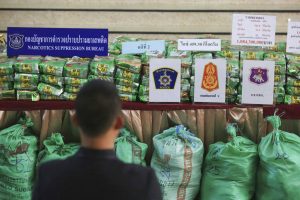Late last week, Thailand’s Health Ministry tightened its rules on methamphetamine possession in an attempt to get a handle on a regional boom in narcotics production.
Under the new regulation, which was issued on February 2, those found in possession of even one methamphetamine pill, known in Thailand as yaba, would be reclassified as drug dealers rather than users. The regulation, which will potentially result in severe penalties for possession of even small amounts of the drug, will now be submitted to the cabinet for approval, Public Health Minister Anutin Charnvirakul announced.
“The changes to the ministerial regulation is to address social problems definitively and effectively and to curb the spread of yaba pills,” Anutin was reported as saying.
According to a report by Reuters, drug dealers currently face a prison term of up to 15 years, or 20 years if found selling to minors, but those caught with smaller amounts are “sometimes able avoid prison in favor of rehabilitation or treatment.”
The proximate cause for the tightening of the laws was the horrific incident last year in which a former policeman, who was discharged from duty for drug use, went on a knife and gun rampage, killing 37 people including 24 children. The grisly crime, which seized headlines across the globe, prompted Prime Minister Prayut Chan-o-cha to demand a crackdown.
The broader context for the change is a significant boom in recent years in the production of methamphetamine and other amphetamine-type stimulants (ATS) in mainland Southeast Asia, particularly in the conflict zones of eastern Myanmar. These have washed across Thailand from the north, which abuts onto loosely regulated parts of Myanmar’s Shan State and northwestern Laos – the so-called “Golden Triangle” – exacerbating the social issues associated with methamphetamine use.
Last year, the United Nations Office on Drugs and Crime reported that the number of methamphetamine tablets seized in East and Southeast Asia exceeded 1 billion for the first time in 2021. This was part of a region-wide haul of almost 172 tons of methamphetamine – an amount seven times higher than that seized 10 years earlier.
Typical of the recent trend was an incident last month in which Thai police killed five suspected drug traffickers and recovered almost 500,000 methamphetamine pills following a clash in the north of the country.
However, the Thai government’s plan has prompted pushback from public health experts, who say the tougher rules could further swell Thailand’s over-capacity prison system, while doing little to address the drivers of drug trafficking. It also appears to contradict the Prayut government’s relatively enlightened stance toward drugs.
In 2021, parliament passed a bill prioritizing prevention and treatment for drug users over punishment for small-time drug users, which the government said has reduced the sentences of almost 50,000 prison inmates. This was followed by the government’s startling (by Southeast Asian standards) decision to decriminalize marijuana last year. Indeed, Prayut’s government is now also moving to tighten its restrictions on the sale and use of marijuana, amid conservative criticisms that the policy has created social problems and encouraged recreational use of the drug.
The government denies that the changes will increase Thailand’s prison population. Anutin said that under the new regulations, not everyone found in possession of more than one methamphetamine tablet will be imprisoned, the Bangkok Post reported. He added that law enforcement authorities will still have the discretion to treat offenders as either addicts or dealers. The government has also promised to bolster the number of hospitals able to treat drug addiction.
The problem for Thailand is that the supply of methamphetamine flowing over its borders is growing and is largely beyond its control. Targeting drug users or small-time distributors – something that amounts to a game of whack-a-mole, whether or not they do prison time – is unlikely to address the root causes of what is now a regional, even global, drug crisis.

































